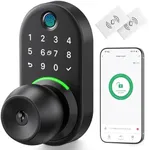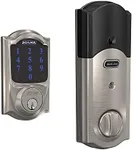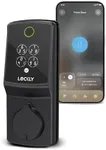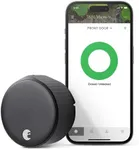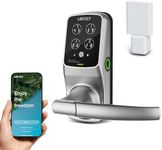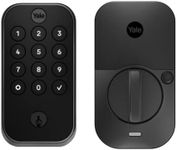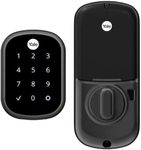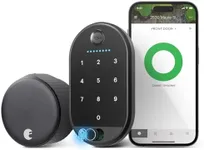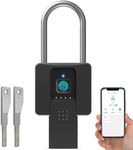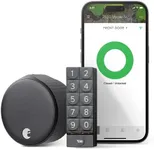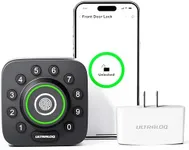Buying Guide for the Best Smart Lock For Gate Outdoor
Choosing the right smart lock for your outdoor gate can significantly enhance your security and convenience. Smart locks offer keyless entry, remote access, and various other features that can make managing your gate easier and more secure. When selecting a smart lock, it's important to consider several key specifications to ensure you get the best fit for your needs. Here are the key specs you should focus on and how to navigate them.Weather ResistanceWeather resistance is crucial for an outdoor smart lock as it will be exposed to various weather conditions such as rain, snow, and extreme temperatures. This spec indicates how well the lock can withstand these elements. Look for locks with an IP rating (Ingress Protection), where a higher number means better protection. For example, an IP65 rating means the lock is dust-tight and can withstand water jets. If you live in an area with harsh weather, opt for a lock with a high IP rating to ensure durability and longevity.
ConnectivityConnectivity refers to how the smart lock communicates with your devices, such as your smartphone or home automation system. Common connectivity options include Bluetooth, Wi-Fi, and Z-Wave. Bluetooth is suitable for short-range control, while Wi-Fi allows for remote access from anywhere. Z-Wave is ideal for integration with a smart home system. Choose the connectivity option that best fits your lifestyle. If you want to control the lock remotely, Wi-Fi is a good choice. For integration with other smart devices, consider Z-Wave.
Power SourceThe power source of a smart lock determines how it is powered and how often you will need to maintain it. Most smart locks are battery-operated, but some may offer solar power or hardwiring options. Battery-operated locks are easy to install and maintain, but you will need to replace or recharge the batteries periodically. Solar-powered locks are eco-friendly and require less maintenance, while hardwired locks offer a constant power supply but may require professional installation. Consider your preference for maintenance and installation when choosing the power source.
Security FeaturesSecurity features are essential to ensure the smart lock provides adequate protection. Look for features such as encryption, tamper alerts, and auto-locking. Encryption ensures that the communication between the lock and your devices is secure. Tamper alerts notify you if someone tries to break into the lock, and auto-locking ensures the gate locks automatically after a certain period. Evaluate your security needs and choose a lock with features that provide peace of mind and enhance the safety of your property.
CompatibilityCompatibility refers to how well the smart lock works with your existing gate and smart home ecosystem. Ensure the lock is compatible with the type of gate you have, whether it's a swinging gate, sliding gate, or another type. Additionally, check if the lock can integrate with your smart home devices, such as voice assistants (e.g., Amazon Alexa, Google Assistant) and home automation systems. Choosing a compatible lock ensures seamless integration and functionality with your current setup.
Ease of InstallationEase of installation is important, especially if you plan to install the smart lock yourself. Some locks are designed for DIY installation with simple tools, while others may require professional installation. Consider your comfort level with DIY projects and the complexity of the installation process. If you prefer a hassle-free setup, look for locks that come with clear instructions and all necessary hardware. For more complex installations, you may want to hire a professional to ensure the lock is installed correctly and securely.
